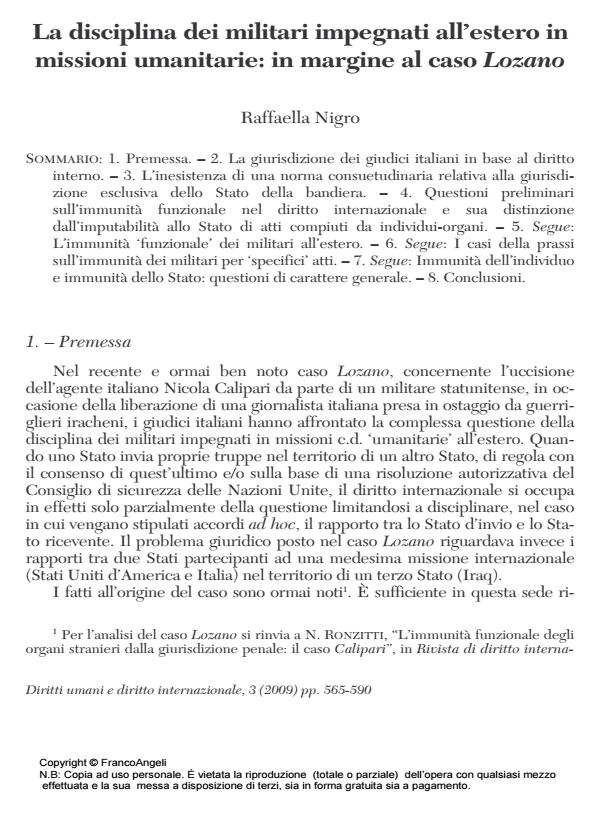La disciplina dei militari impegnati all’estero in missioni umanitarie: in margine al caso Lozano
Titolo Rivista DIRITTI UMANI E DIRITTO INTERNAZIONALE
Autori/Curatori Raffaella Nigro
Anno di pubblicazione 2009 Fascicolo 2009/3
Lingua Italiano Numero pagine 26 P. 565-590 Dimensione file 393 KB
DOI 10.3280/DUDI2009-003007
Il DOI è il codice a barre della proprietà intellettuale: per saperne di più
clicca qui
Qui sotto puoi vedere in anteprima la prima pagina di questo articolo.
Se questo articolo ti interessa, lo puoi acquistare (e scaricare in formato pdf) seguendo le facili indicazioni per acquistare il download credit. Acquista Download Credits per scaricare questo Articolo in formato PDF

FrancoAngeli è membro della Publishers International Linking Association, Inc (PILA)associazione indipendente e non profit per facilitare (attraverso i servizi tecnologici implementati da CrossRef.org) l’accesso degli studiosi ai contenuti digitali nelle pubblicazioni professionali e scientifiche
Armed Forces engaged in humanitarian missions abroad: the Lozano case - In the well-known Lozano case, an Italian intelligence agent, Mr Nicola Calipari, remained killed in 2005 by an American soldier, Mr Mario Luis Lozano, while entering a US checkpoint on the way to the Baghdad airport soon after securing the release of an Italian journalist from Iraqi kidnappers. In the ensuing case, Italian courts addressed a number of sensitive questions, including that of jurisdiction over national troops involved, directly or indirectly, in so-called "humanitarian missions" abroad. Italian courts did have jurisdiction over the killing under Italian domestic law. Indeed, the murder of Mr Calipari can be regarded as a "political crime" under Article 8 of the Italian penal code. On such a premise, the question is whether Article 8 was superseded by a customary international law rule under Article 10 of the Italian Constitution aimed at excluding jurisdiction over Mr Lozano. State practice suggests that neither a customary rule on the exclusive jurisdiction of the sending State (as claimed by the Court of Assise of Rome in 2007) nor a customary rule on Mr Lozano’s functional immunity (as claimed by the Court of Cassation in 2008) are established in customary international law. Rather, State practice reveals that a number of States are likely to recognize immunity from jurisdiction to the armed forces only in certain specific circumstances. Moreover, such immunity is quite different from the functional immunity traditionally enjoyed by diplomatic and consular agents, as well as from the immunities enjoyed by other high-ranking State officials, such as the Head of State, the Head of Government and the Minister for Foreign Affairs.
Raffaella Nigro, La disciplina dei militari impegnati all’estero in missioni umanitarie: in margine al caso Lozano in "DIRITTI UMANI E DIRITTO INTERNAZIONALE" 3/2009, pp 565-590, DOI: 10.3280/DUDI2009-003007